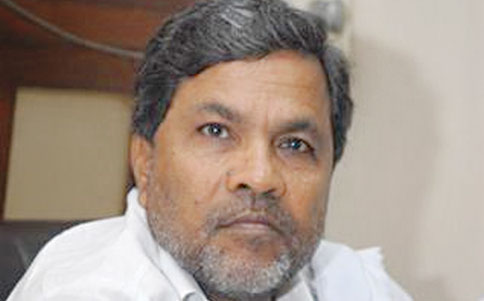Bengaluru: Chief Minister Siddaramaiah on Thursday instructed the Bangalore Water Supply and Sewerage Board (BWSSB) to crack down on unauthorised water connections in the City and disconnect them without any hesitation. DH photo
Chief Minister Siddaramaiah on Thursday instructed the Bangalore Water Supply and Sewerage Board (BWSSB) to crack down on unauthorised water connections in the City and disconnect them without any hesitation.
Expressing concern over the high percentage of unaccounted for water (UFW), the chief minister asked the board officials to strive to reduce the current UFW percentage of 46 to the international standard of 15 per cent in the coming years. As per BWSSB records, there is 22 per cent of unauthorised and illegal water connections and 15 per cent of leakage of water while distribution.
Speaking at the golden jubilee celebration of the BWSSB here, Siddaramaiah urged the public to adopt rainwater harvesting (RWH) on their buildings. “Bengaluru receives over 10 TMC (Thousand Million Cubic) of rainwater throughout the year. If at least 50 per cent of this rainwater is stored and used, the City’s water crisis can be solved to a great extent. There is a need for greater awareness among the general public about RWH,” he added.
The chief minister also urged the board officials to recycle and reuse water for non-potable purpose and asked them to take suggestions from former BWSSB engineers.
As Bengaluru never grew in a scientific manner after its expansion from 270 sq km to 800 sq km, and with population and migration still growing, it has become necessary that every citizen saves water and uses them judiciously, he said.
At present, the BWSSB supplies over 1,400 million litres water every day and with the increasing population, the demand is only going to increase.
Justifying the increase in water tariff, Bengaluru district in-charge minister Ramalinga Reddy said that the decision was long overdue and was finally taken for the welfare of the board.
As the BWSSB was facing severe losses, water tariff had to be hiked to balance the profit and loss.
He urged the board officials to ensure treatment of sewage water and avoid sewerage flow in storm water drains.
Infrastructure Minister R Roshan Baig said that it was time the government started looking beyond river water as the demand for water would not be solved in the next 30 years. Citing the example of West Asia, Baig predicted that a time would come when the government would think of drawing seawater from Mangaluru to desalinate and supply it to the people in Bengaluru.
He also asked the BWSSB to completely stop any kind of manual scavenging and instead use machines to clean the sewer lines.

